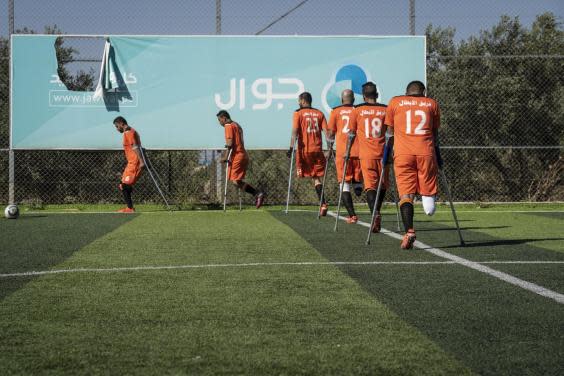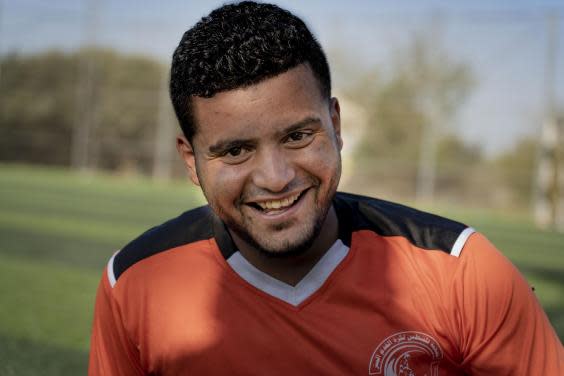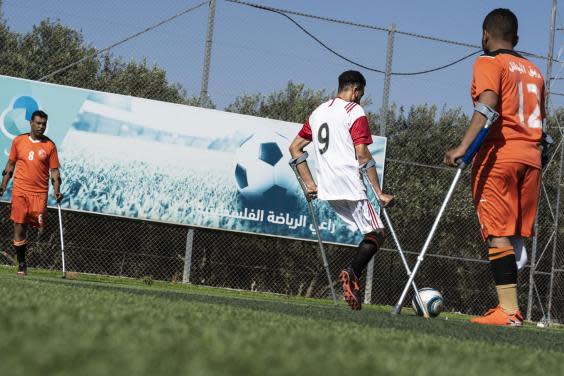A league of champions: Gaza amputees tackle despair with football
The crowd around him scattered like shattering glass.
In shock, Bahaa, 20, from Gaza, did not at first understand why, or why some of his friends were lying motionless on the ground beside him.
Then he saw his own leg limply hanging off his blood-stained trousers.
He had been just 400m away from the border fence between Gaza and Israel on 14 May 2018, the day Donald Trump moved the US embassy from Tel Aviv to the contested city of Jerusalem, thereby recognising it as Israel’s capital.
That afternoon Israeli soldiers shot dead nearly 60 Palestinians and injured over 2000 more as protests against the White House’s contentious decision turned violent.
Gaza’s main al-Shifa hospital, overwhelmed by the nearly 1300 people who had been wounded by live fire, could not save Bahaa’s right leg.
The young and impoverished clothes vendor, trapped in the 25-mile-long enclave that is crippled by an Israeli blockade, felt like he hadn’t just lost a leg, but his entire future.
That was until he was approached by Gaza’s first amputee football team.
“I was depressed and worried I couldn’t work anymore,” he tells The Independent, taking a breather from training at a pitch in Gaza’s central Deir al-Balah district.
“Before I was injured, football had been very important to me and I thought I would never play again.”
He was sceptical when he was first invited to join the team.
“I had to relearn the whole game again, I was learning the basics with a crutch,” he adds.
The Palestinian Amputee Football Association (PAFA) was formed in Gaza just a few months before Bahaa’s injury.
Ironically it held its inaugural training session on 30 March 2018, the first day of the Great March of Return protests that have seen hundreds of thousands of Gazans rally on the border with Israel every week, against the blockade.
Israeli soldiers have been accused by the United Nations of committing war crimes for opening fire on the crowds. The army has defended its actions, saying protesters are violent and threaten Israeli civilians.
Over the past year nearly 7000 Palestinians have been injured by Israel’s live bullets, of which 120 have had their legs amputated, including 20 children.
Recently the United Nations warned that an additional 1700 people in need of complex surgery could also lose their limbs because of chronic health-funding shortfalls.
The fledgeling football association, which began with just five players, had no idea it would have a wave of newly injured young men like Bahaa joining the ranks.
It now has 80 players and seven men’s teams across the strip. There are plans to build a women’s league as well.
Dressed in his team’s orange kit, Bahaa says football helped him get his life “back to normal”. He now has a prosthetic leg and is back to work after building up his strength during football practice.
“I hope I can play internationally for Palestine. My dream is to meet and play with [Liverpool’s] Mohamed Salah.
“I always have hope now,” the striker adds.
And that dream is now a potential not-so-distant reality.
Gaza is in the process of applying to join the World Amputee Football Federation (WAFF), which has players from across 46 nations.
With the help of the International Committee of the Red Cross (ICRC), Simon Baker, the secretary-general of WAFF’s European Amputee Football Federation, came to Gaza last month to train up the team’s coaches and help them build a proper league.
The London-born Irish player hopes to whip Gaza’s association into shape so it can secure a place in the world federation and, if it can get permits from Israel, travel abroad to compete in the 2022 Amputee Football World Cup.
In the medium term, Baker aims to return to Gaza in six months to monitor the players’ progress. If they are up to scratch, he plans to host a championship in Dublin next spring which the Gaza team will be invited to, along with players from other countries.

“At first the players in Gaza were worried that everyone looked at them as simply disabled.
“We want people to see the sport being played and the players first, not the disability of the person,” Baker tells The Independent.
Baker himself lost his leg in a 2004 accident when he fell while working as a construction worker. He says the accident left him feeling suicidal.
But eight operations later, he decided to turn his life around and become a professional footballer.
“Sport is a fantastic way to reinvent yourself,” he continues. “We have a saying in [amputee football]: we want people to say ‘wow!’ not ‘ah’.
“We want you to pat us on our backs, not our heads.”
That is why the coaches in Gaza were taught to treat the team the same as professional athletes, with a rigorous training schedule.
“I told them, don’t put your arm around them, treat them as normal players,” he adds.
On the pitch, despite the fact the entire team is fasting for the holy month of Ramadan, the session is long and gruelling.

The players, all of whom are missing a limb, move swiftly and nimbly across the pitch on crutches the ICRC brought into the strip.
Only the goalkeepers do not have crutches: instead both of them are missing one arm.
“I never thought I would play football professionally even when I had my two legs,” says Alaa al-Aaydi, 42, a father of five who was shot during the first day of the protests at the Gaza-Israel border.
He tried to be referred to an Israeli hospital after a botched operation in Gaza left him with a severed vein that bled into his closed wound for four days.
Israel rejected the permit to travel. The only way to save his life was to lose the limb that was poisoning his body.
“When the doctors told me they had to cut it off, I was so depressed I fought with them,” he says.

“Afterwards I was approached by the football team and thought there is no way you can play football on crutches, I was wrong.”
Looking back at the pitch he adds: “Never in my life did I ever dream I could be an international athlete – until now.”
Among the team is Abdulrahman Nofal, 12, who was not present during the training as he was in the West Bank for treatment. The football fanatic was just 11-years-old when an Israeli soldier shot him in the leg as he ran to fetch a football while playing with friends during a border protest last May.
At the time, he told this reporter he felt his dream of being a striker had been shattered by the amputation.
But Mahmoud Naouq, one of the co-creators of PAFA, told The Independent Abdulrahman is now one of their top youth players. He trains regularly with the adults and dreams of joining the Palestinian national team when he is old enough.
Naouq lost both legs when he was hit by two Israeli airstrikes, which struck his home and the hospital where he was being treated during the 2014 war.
Never in my life did I ever dream I could be an international athlete – until now
Alaa al-Aaydi, 42, a member of Gaza’s first amputee football team
As a double amputee he cannot play football and so manages the teams instead. At the moment he says they are looking for additional donations and a potential sponsor to pay for the pitch rental, transport and cost of the kits. The coaches, who are desperate for additional training, are still volunteers.
“When we created the association, we had no idea there would be a sudden spike in leg injuries,” he adds. “We had no idea so many people would want to join.”
The ICRC, which is still supporting the programme, said it has had a “profound” impact on people, as sport not only gets people back into society but offers them education and employment opportunities.
“It is a big challenge in Gaza,” says the ICRC’s Jess Markt, who is also a wheelchair basketball coach.

“But you see people who no longer see themselves as just having disabilities but who identify primarily as athletes. That is a profound shift in how they present themselves to society and the rest of the world,” he adds.
Back at the pitch, where the training session is winding down, Naouq agrees.
“Our message to Gaza’s many injured is that even if you lose your leg this is not the end of your life, you do not need to lock yourself up in your home, you can actually flourish,” he says against the setting sun.
“Our second message is to the Israelis that whatever they do to harm us, we will stand our ground and live. Our third message is to the world that we Palestinians are here to live and thrive, we are not just born to suffer.”
